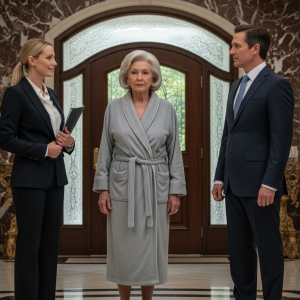Of course. I will rewrite your story, enhancing the drama, dialogue, and pacing while adhering to your formatting and length requirements. Here is the developed and polished narrative.
At my daughter Sarah’s wedding, I overheard my son-in-law confess to his best man. He’d not only been unfaithful but was marrying her solely for our family’s money. So, I made a single phone call. Just before he could say, “I do,” the police walked in, and the look on his face as the handcuffs clicked shut was worth every sleepless night I’d spent unraveling his lies.
But this story doesn’t start there. It began six months earlier, with a man named Brad Thompson playing a long game. Unfortunately for him, I’ve been playing longer.
It started when Sarah brought home the man she called “perfect.” I’m 55 years old, and my life has taught me that when something seems too perfect, it’s usually a well-rehearsed lie. But Sarah was 32, a successful marketing executive, and I trusted her judgment. That was my first mistake.
Since her father David died five years ago, Sarah and I have been inseparable. David’s engineering patents and life insurance left us comfortable—not wealthy, but secure. In a small town like Cedar Ridge, however, “secure” is often mistaken for “rich,” and whispers travel fast.
Brad was like a character plucked from a bad romance novel: tall, with dark hair and eyes so blue they seemed engineered for sincerity. He drove a sleek BMW, wore impeccably tailored suits, and claimed to be an “investment consultant”—a fancy title for helping wealthy people hide their money.
During our first Sunday dinner, I watched him work the room like a seasoned politician. He praised my pot roast, asked insightful questions about David’s work, and feigned perfect interest in old family photos. He even brought a bouquet of expensive lilies, not the cheap carnations from the gas station.
“Mrs. Harrison,” he said, taking my hand in both of his with a practiced warmth that set off every alarm in my head. “Sarah has told me so much about you. I can see where she gets her strength and grace.”
If he only knew my idea of grace was resisting the urge to ask what he was really selling. But Sarah was glowing, hanging on his every word and shooting me looks that pleaded, Please like him, Mom. So I smiled, playing the role of the charmed mother-in-law, because that’s what we do. We bite our tongues and pray our instincts are wrong.
Later, while Sarah was in the kitchen, Brad settled into David’s armchair as if he owned it. His questions started casually, then sharpened, probing into our finances. “How are you managing as a widow? Did you have to make any major investment decisions after David passed?” Red flags were now a full-blown parade.
I kept my answers vague. “We’re managing just fine, thank you.”
“I’m sure you are,” he replied, that polished smile never wavering. “But if you ever want an opportunity to make your money work harder for you, I’d be happy to review your portfolio. Family rates, of course.”
Family rates. We had known each other for three hours. The man was a chameleon, and I was certain we were only seeing the colors he wanted us to see. That night, I decided to watch Mr. Perfect very, very closely.
At our second dinner, Brad brought a bottle of Bordeaux that cost more than my weekly groceries. It was another piece of the puzzle that didn’t fit. “Every dinner with your family is a special occasion, Mrs. Harrison,” he said smoothly when I commented on it. A politician’s answer—it sounds lovely but says nothing.
While they were outside admiring my roses, I did what any sensible mother would do: I Googled him. “Brad Thompson, Investment Consulting, Cedar Ridge” returned nothing. No business license, no professional certifications, not even a LinkedIn profile matching his grand descriptions. For a man who claimed to handle high-net-worth portfolios, he had the digital footprint of a ghost.
A few weeks later, Sarah announced, “Mom, Brad and I think it’s time for me to change my investment strategy.”
Brad leaned forward, his face a mask of earnest concern. “Sarah mentioned she’s keeping her inheritance in traditional savings. With inflation, she’s practically losing money. I’m assembling a conservative portfolio for her—nothing risky, just stable growth.”
My mind screamed, Why is my daughter’s six-week boyfriend managing her finances? But I said, “I’m sure you’ll make good decisions, honey.” Sometimes, you have to let your children walk toward their own mistakes, even when you can see the cliff’s edge.
Over the following months, Brad became a fixture, a perfect, charming phantom in our lives. But I noticed the inconsistencies. He claimed a Connecticut upbringing but didn’t know basic state geography. He said he was a Yale graduate but couldn’t name his freshman dorm. These weren’t simple memory lapses; they were holes in a badly constructed facade.
Three months after they moved in together, they announced their engagement. The ring was a stunning two-carat solitaire, far too expensive for a freelance consultant. “A friend in the jewelry business,” Brad explained smoothly. “Gave me a great deal on a stone another customer returned.” Another convenient, unverifiable “great deal.”
That night, I hired a private investigator. Patricia, a sharp woman from my book club, began digging. Her initial findings were unsettling. No record of Brad Thompson attending Yale. No birth records in Connecticut. His credit history was only three years old.
Most disturbingly, she found an arrest record from Nevada for a “Bradford Wilson” on fraud charges two years prior. Same age, similar description. The charges were dropped when the victims suddenly refused to testify. It wasn’t definitive proof, but it was enough. Coincidences like that don’t just happen; they’re engineered. I needed more than suspicion. I needed a trap.
I called my old college roommate, Helen, who lived in the heart of Greenwich, Connecticut—the world Brad claimed as his own. I invited her for a “surprise” visit during a Sunday dinner.
When I introduced Helen as my old friend from Greenwich, I saw a flicker of pure panic in Brad’s eyes before his charming mask slid back into place. “Greenwich!” he boomed. “Beautiful area. Do you know the Hamiltons? Near the yacht club?”
Helen smiled, a polite, predatory smile. “I’ve been a member of that club for thirty years. Which Hamiltons are you referring to?”
Brad’s composure tightened. “Oh, you know, family friends of my parents. I don’t know them well personally.”
Helen wasn’t done. “And Yale! Sarah mentioned you went there. What residential college?”
“Pearson,” Brad answered without a blink.
“How fascinating,” Helen said, her voice dripping with false sweetness. “My nephew Tommy just graduated from Pearson. You must have known him.” When Brad claimed the name sounded familiar, Helen delivered the final blow. “That’s funny. Because my nephew Tommy went to Princeton. And I’ve never had a nephew.”
The silence was deafening. Sarah looked utterly confused. Brad looked like a man calculating the nearest exit. And I knew, with chilling certainty, that my instincts had been right all along.
Two months before the wedding, Sarah dropped a bombshell. “We found an amazing investment opportunity!” she said, her eyes alight. “Private real estate development—luxury condos in Colorado. Brad says the returns could be incredible.”
My blood ran cold. “What kind of investment? How much?”
“Most of it,” she said casually, as if discussing the weather. “About $400,000. Brad says we could double it in two years.”
Four hundred thousand dollars. Her entire inheritance from David. Gone.
“Sarah,” I said, struggling to keep my voice steady. “Did you have a lawyer review the documents?”
Her face clouded with irritation. “Mom, Brad’s a professional. This is what he does. I trust him.”
Trust. The currency of every con artist. That night, I called Patricia. Her findings were worse than my darkest fears. “Margaret, the company doesn’t exist,” she said, her voice grim. “The property address is an empty lot. I traced the wire transfer. The money went into an account Brad controls, then was immediately scattered across multiple offshore accounts. The money’s gone.”
Staring at the elegant wedding invitations on my counter, a single thought consumed me: Brad had stolen everything, and my daughter was still planning to marry him. The wedding wasn’t the end of his con; it was the beginning of the next phase. He was positioning himself to gain legal access to everything else: her retirement, her future earnings, even my estate.
I had to stop the wedding. But how? Sarah was blinded, and my evidence was still circumstantial. I needed to catch him in the act.
So I set another trap, this one baited with something a man like Brad could never resist: the promise of more. I began dropping hints about a fictional inheritance I was expecting from a distant aunt.
“Aunt Ruth was always eccentric,” I’d say over dinner. “I never expected her to leave me something so… substantial.”
Brad’s interest was immediate and intense. “That’s wonderful news, Margaret! These situations can be complex. I’d be happy to review the legal documents for you, make sure you’re making the right decisions.”
There it was. The predator, smelling blood in the water. The wedding was four weeks away. It was time to set the final trap.
Three weeks before the wedding, I crossed a line. Patricia procured a tiny, undetectable listening device from a law enforcement contact. “This is probably illegal,” she warned.
“So is stealing $400,000 from my daughter,” I replied. I planted the device in Brad’s BMW, hoping to catch him discussing his plans. For two weeks, I listened to hours of mind-numbing recordings: wedding plans, mundane calls, him singing off-key to the radio.
Then, one week before the wedding, I hit the jackpot. He was at lunch with his accomplice, a man named Dany.
“You sure about the timeline?” Dany asked.
Brad’s voice was cold and clear. “The wedding is next Saturday. As soon as we’re legally married, I get access to everything. Her trust accounts, retirement funds, plus the inheritance from the old lady.”
“What about the 400k you already got?”
Brad laughed, a chilling, ugly sound. “That was just the appetizer. The real money comes after the ‘I do.’ Give me six months to clean them out completely. By the time Sarah realizes what’s happened, I’ll be long gone.”
“And if she figures it out?”
“She won’t,” Brad said with absolute confidence. “She’s so completely under my spell. She thinks I’m Prince Charming and her mother is just a suspicious old bat.”
Listening to him calmly detail his plan to destroy my daughter’s life, I felt a rage so pure it was almost clarifying. This wasn’t just about money anymore. This was about justice. But a recording wasn’t enough. I needed to expose him publicly, in a way he could never deny.
The night before the wedding, I made my final call to Sarah. “I’ve never been more sure of anything,” she told me, her voice filled with joy. “Brad is everything I’ve ever wanted.” My heart broke, but my resolve hardened.
“I love you, Sarah,” I said, my voice thick with unspoken warnings. “Whatever happens tomorrow, remember that.”
The wedding morning was bright and clear—a perfect day for a disaster. As guests filled the church, I sat in the front pew, my phone clutched in my hand, my heart hammering against my ribs.
Fifteen minutes before the ceremony, I saw Brad slip out a side door, phone to his ear. I followed him. Hidden behind a pillar, I heard him speaking to Dany.
“In about twenty minutes, I’ll officially be married to my retirement fund,” he gloated. “This girl is so naive, she’ll sign anything. I’ve already started working on the mother’s assets. She has major abandonment issues since her dad died. She’ll do anything to keep from being alone again.”
Psychoanalyzing my daughter’s grief to exploit it—that was his final mistake. I recorded his every word, then sent a single text to Detective Morrison, Patricia’s contact: It’s happening. Come now.
The ceremony began. Sarah was a vision in white, her face radiant as she walked down the aisle. As she took Brad’s hand, I saw the cold calculation in his eyes, expertly masked by a devoted gaze.
The vows were exchanged—Sarah’s genuine and heartfelt, Brad’s a masterpiece of romantic fiction. Then, Reverend Mitchell spoke the words I’d been waiting for.
“If anyone present knows of any reason why this couple should not be joined in marriage, let them speak now or forever hold their peace.”
I started to rise, but before I could, Brad’s best man grabbed his arm, his face pale with panic. “Dude,” he hissed, “There are cops outside. Like, a lot of them.”
Brad’s charming mask didn’t just slip; it shattered. His eyes darted around the church, landing on me with a look of pure fury. He knew.
“Actually, Reverend,” I said, my voice ringing through the silent church as I stood. “There is a problem.” I held up my phone. “I think everyone here deserves to hear what the groom really thinks about this marriage.”
His real name echoed through the sanctuary. “Bradley Wilson,” I announced, “Your performance is over.”
He panicked. In front of two hundred guests, the groom hiked up his tuxedo and bolted for the side door—directly into the arms of Detective Morrison and two uniformed officers.
Sarah sank into a chair, her world collapsing around her. “Mom,” she whispered, her voice broken. “What just happened?”
I knelt beside her, surrounded by the ruins of her perfect day. “I’m so sorry, baby,” I said, taking her hand. “But I saved you. He was never who he said he was.”
In the weeks that followed, the story of the wedding-day arrest became Cedar Ridge legend. Bradley Wilson, it turned out, was a serial predator. We were not his first victims, but thanks to our evidence, we would be his last. We learned he had defrauded seven other women out of more than $2 million.
The community rallied around us, a testament to small-town kindness. We managed to recover over half of Sarah’s inheritance, a small miracle in cases like these. Bradley pleaded guilty and was sentenced to ten years in federal prison. It wasn’t enough, but it was justice.
Sarah was shattered but resilient. She started therapy, processing the deep betrayal. We began volunteering at fraud prevention seminars, sharing our story to help others avoid the same fate. Turning our pain into a shield for other women was the best revenge we could imagine.
One evening, nearly a year later, we were decorating the Christmas tree. “Mom,” Sarah asked quietly, “do you think Dad would have seen through him?”
“I think your dad would have asked the kind of detailed questions that would have made Brad’s story fall apart,” I said. “He always saw the cracks in a faulty design.”
“I’m proud of you,” Sarah said, her voice clear and strong. “For trusting your instincts when I couldn’t. For saving me from myself.”
“And I’m proud of you,” I replied. “For being strong enough to heal.”
Two years later, I sat in that same church, but this time, the joy was real. Sarah was marrying David Martinez, a kind and gentle high school teacher she’d met at one of our seminars. His background had been thoroughly vetted—by me, Patricia, and David himself, who had laughingly called our first meeting “the interrogation.”
When Reverend Mitchell reached the part about objections, the church remained silent. The only sounds were happy tears.
At the small reception in my backyard, I learned that Brad was teaching financial literacy classes in prison. The irony was not lost on me.
Later, Sarah pulled me aside. “I got a letter from him,” she said. “He wanted to apologize. And I wrote him back. I told him I forgave him.” I must have looked horrified, because she quickly added, “Not for him. For me. I needed to let the anger go to be truly free.”
I looked across the lawn at David, her new husband, a good man who loved my daughter for who she truly was. She was right. The chapter was finally, truly closed.
Brad Wilson tried to con the wrong family. He underestimated a mother’s intuition and a daughter’s resilience. He thought he could destroy us, but in the end, his betrayal only revealed the unshakeable strength of our bond. Sometimes, the best revenge isn’t revenge at all. It’s living a happy, authentic life, built on the wreckage of a liar’s discarded plans. And that’s exactly what we did.




